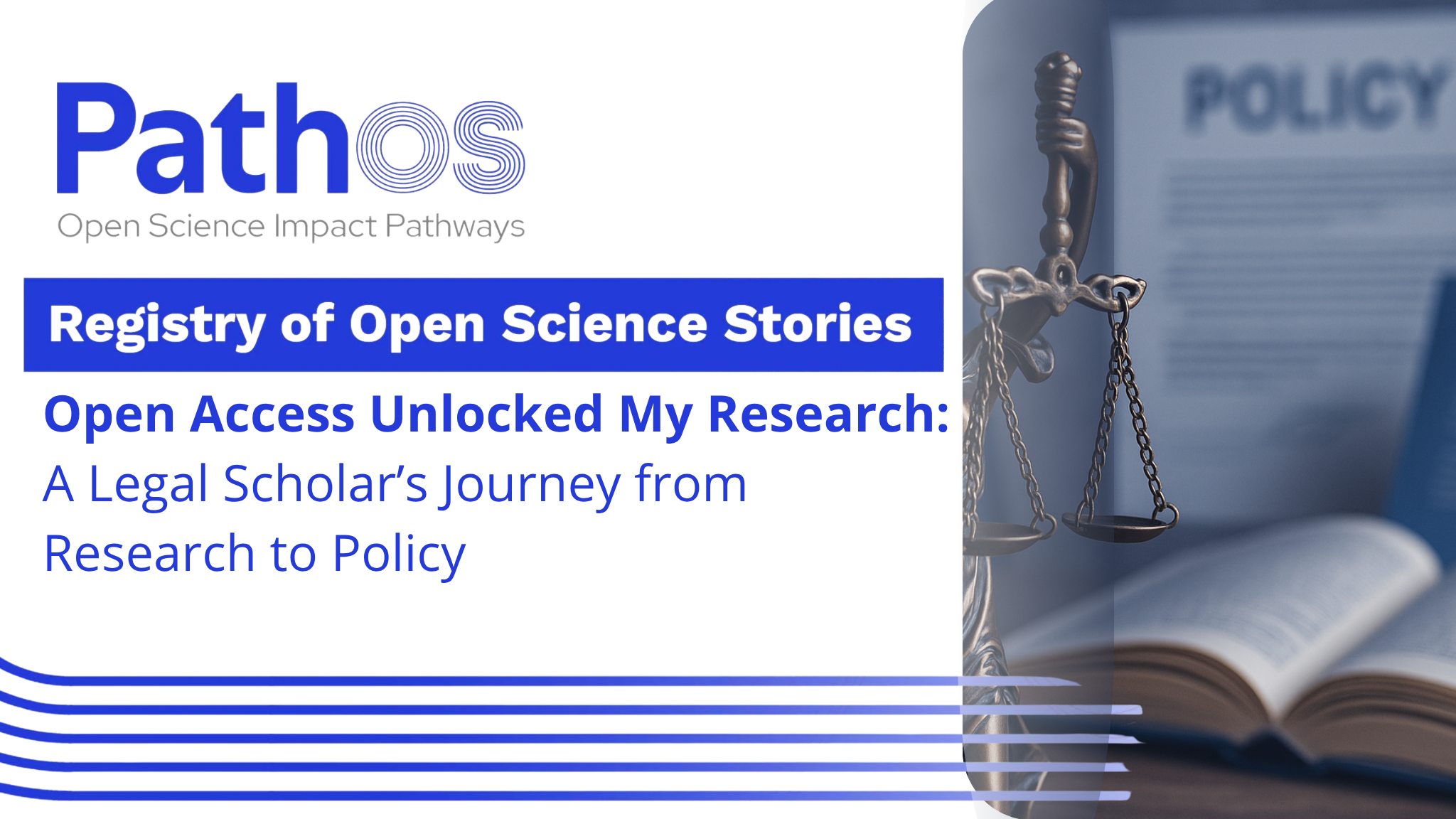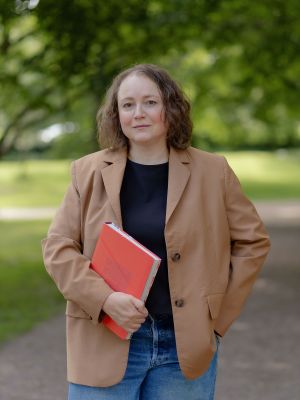Open Access Unlocked My Research:
A Legal Scholar’s Journey from Research to Policy
A Legal Scholar’s Journey from Research to Policy

Within PathOS we are collecting stories on how Open Science (Open Access to publications, Open/FAIR data and software, collaborations with citizens) has made a positive or negative impact. Our ultimate aim is to highlight stories of Open Science practices and how these are linked to impactful outcomes. In this way, we hope to foster a learning experience and to inspire others to follow. Join us and read the first Open Science stories!
Could you briefly introduce yourself and what your Open Science story is about, including its time (e.g. year range) and location?
Hello, I’m Natalia Mishyna, a legal researcher at the SAGE Laboratory at the University of Strasbourg and a professor of constitutional law from Ukraine.
My Open Science journey began in 2023 when I started my Marie Skłodowska-Curie MSCA4Ukraine fellowship. In Ukraine, awareness of Open Access in general, and of how it helps to share research results, raise awareness, facilitate dissemination and build networks and visibility, is practically absent, so most of the information was new to me. I studied it to meet the requirements of my fellowship.
Open Science has become a field of interest to me as a researcher, due to the opportunities it provides.

"Open Science has completely changed the way I think about research. I now view academic work as part of a broader system connecting scholars, institutions and society. Open Science facilitates collaboration and enables your research to contribute where it’s needed, including in policymaking and social recovery."
What was the context or background in which this Open Science practice was used? What were the goals or expected outcomes?
My research aimed to explore how the judgments of the European Court of Human Rights (ECtHR) can be implemented more effectively by local and regional authorities, particularly in crisis settings — not only in Ukraine, but across all Council of Europe member states.
The context was local self-government in Ukraine under martial law, its potential for rebuilding Ukraine after the war, and the need to rebuild democratic institutions.
Making these findings available to policymakers and researchers both in and outside Ukraine was made easier by using Open Access.
What was your role or relationship to this Open Science practice? Were you a direct participant, an observer, or something else?
I was a direct participant. I published my MSCA-funded research via Open Access channels and managed its visibility through academic platforms and professional networks.
How was this Open Science practice implemented, to your knowledge? Who were the key actors involved?
Open Access publication was a requirement of the funding body (the European Commission via the MSCA). I therefore ensured that my peer-reviewed articles were published in Open Access journals with the appropriate licences and were indexed in major databases such as Web of Science and Scopus. They were also made accessible through platforms such as ResearchGate and Google Scholar.
I also participated in academic conferences and workshops where sharing preliminary findings and research outputs with open audiences was encouraged. The main actors involved were the University of Strasbourg (my host institution for the MSCA project at the SAGE Laboratory) and the journals or platforms that ensured open accessibility.
Were there any quantifiable outcomes or measurable successes linked to this practice? What metrics or indicators were used to evaluate these outcomes, if any?
Yes, before Open Access, my academic articles were hardly ever cited. However, two articles that I published in 2023 received over 20 citations each within a year, compared to a total of 41 citations for similar work published previously over a period of five years. This demonstrated a significant increase in visibility and engagement.
What impacts, both expected and unexpected, did this practice have? Were there any surprising developments or results?
One surprising outcome was an invitation to work as an expert for the Council of Europe, based on my Open Access research. I was invited to support the Congress of Local and Regional Authorities of the Council of Europe in their efforts to promote human rights under martial law in Ukraine.
I was also invited to contribute to another Council of Europe project, which was more practical in nature — the HELP programme.
Based on this assignment, in September 2024 I presented my findings on local governance and human rights implementation to the Group of Independent Experts of the Congress of Local and Regional Authorities in Strasbourg. This gave me the opportunity to disseminate my findings, inspired me with further research ideas and, moreover, helped me connect with scholars from other Council of Europe member states. For example, I met Professor Annegret Eppler, a German expert affiliated with the Faculty of Law at the University of Public Administration in Kehl. Since our meeting, we have organised several events on problems relating to local self-government. I did not expect my publications to have such a strong impact at the policy level.
What challenges were associated with this practice, from your perspective? What lessons can be drawn from its implementation?
One of the challenges I faced was learning how to promote Open Access content effectively. Initially, I had no strategy to increase visibility and underestimated the importance of having a strong digital presence. The lesson I learned is that Open Access alone isn’t enough — you also need to actively share and communicate your work to reach the right audiences.
I'm also very grateful for the opportunity to pay for open access publication using project funds. For example, I wouldn't have been able to afford the cost of publishing my chapter on local self-government in the forthcoming Springer book on sustainable development.
How do you perceive this practice's influence on the wider scientific community or society? Has it affected your own views or approaches to research?
Open Science completely changed the way I think about research. I now view academic work as part of a broader system connecting scholars, institutions and society. Open Science facilitates collaboration and enables your research to contribute where it’s needed, including in policymaking and social recovery.
Based on your experience or observation, would you recommend this Open Science practice to others? Why or why not?
Yes, I would recommend it, and I actually recommend it whenever I teach my Master's and PhD students. From my experience, Open Access is one of the most effective ways to ensure your work is seen, shared and referenced beyond academic circles. It enables your research to reach policymakers, civil society and professionals, who often don't have access to subscription-only journals. Open Science opens the door to real-world collaboration and visibility, and for legal researchers like me, it's a way of helping to shape changes in the society.